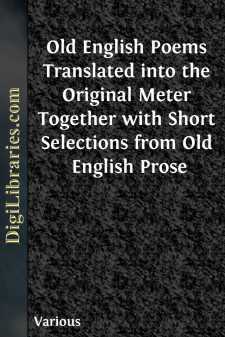Categories
- Antiques & Collectibles 13
- Architecture 36
- Art 48
- Bibles 22
- Biography & Autobiography 813
- Body, Mind & Spirit 142
- Business & Economics 28
- Children's Books 14
- Children's Fiction 11
- Computers 4
- Cooking 94
- Crafts & Hobbies 4
- Drama 346
- Education 46
- Family & Relationships 57
- Fiction 11829
- Games 19
- Gardening 17
- Health & Fitness 34
- History 1377
- House & Home 1
- Humor 147
- Juvenile Fiction 1873
- Juvenile Nonfiction 202
- Language Arts & Disciplines 88
- Law 16
- Literary Collections 686
- Literary Criticism 179
- Mathematics 13
- Medical 41
- Music 40
- Nature 179
- Non-Classifiable 1768
- Performing Arts 7
- Periodicals 1453
- Philosophy 64
- Photography 2
- Poetry 896
- Political Science 203
- Psychology 42
- Reference 154
- Religion 513
- Science 126
- Self-Help 84
- Social Science 81
- Sports & Recreation 34
- Study Aids 3
- Technology & Engineering 59
- Transportation 23
- Travel 463
- True Crime 29
Old English Poems Translated into the Original Meter Together with Short Selections from Old English Prose
by: Various
Description:
Excerpt
PREFACE
These selections from Old English poetry have been translated to meet the needs of that ever-increasing body of students who cannot read the poems in their original form, but who wish nevertheless to enjoy to some extent the heritage of verse which our early English ancestors have left for us. Especially in the rapid survey of English literature given in most of our colleges, a collection of translations covering the Anglo-Saxon period and reflecting the form and spirit of the original poems should add much to a fuller appreciation of the varied and rich, though uneven, literary output of our earliest singers.
In subject-matter these Old English poems are full of the keenest interest to students of history, of customs, of legend, of folk-lore, and of art. They form a truly national literature; so that one who has read them all has learned much not only of the life of the early English, but of the feelings that inspired these folk, of their hopes, their fears, and their superstitions, of their whole outlook on life. They took their poetry seriously, as they did everything about them, and often in spite of crudity of expression, of narrow vision, and of conventionalized modes of speech, this very “high seriousness” raises an otherwise mediocre poem to the level of real literature. Whatever may [6] be said of the limitations of Old English poetry, of its lack of humor, of the narrow range of its sentiments, of the imitativeness of many of its most representative specimens, it cannot be denied the name of real literature; for it is the direct expression of the civilization that gave it birth—a civilization that we must understand if we are to appreciate the characteristics of its more important descendants of our own time.
Although the contents of these poems can be satisfactorily studied in any translation, the effect of the peculiar meter that reinforces the stirring spirit of Old English poetry is lost unless an attempt is made to reproduce this metrical form in the modern English rendering. The possibility of retaining the original meter in an adequate translation was formerly the subject of much debate, but since Professor Gummere’s excellent version of Beowulf and the minor epic poems, and other recent successful translations of poems in the Old English meter, there can be no question of the possibility of putting Anglo-Saxon poems into readable English verse that reproduces in large measure the effect of the original. To do this for the principal Old English poems, with the exception of Beowulf, is the purpose of the present volume.
Except for the subtlest distinctions between the types of half verse, strict Old English rules for the alliterative meter have been adhered to. These rules may be stated as follows:
[7]1. The lines are divided into two half-lines, the division being indicated by a space in the middle.
2. The half-lines consist of two accented and a varying number of unaccented syllables. Each half-line contains at least four syllables....












